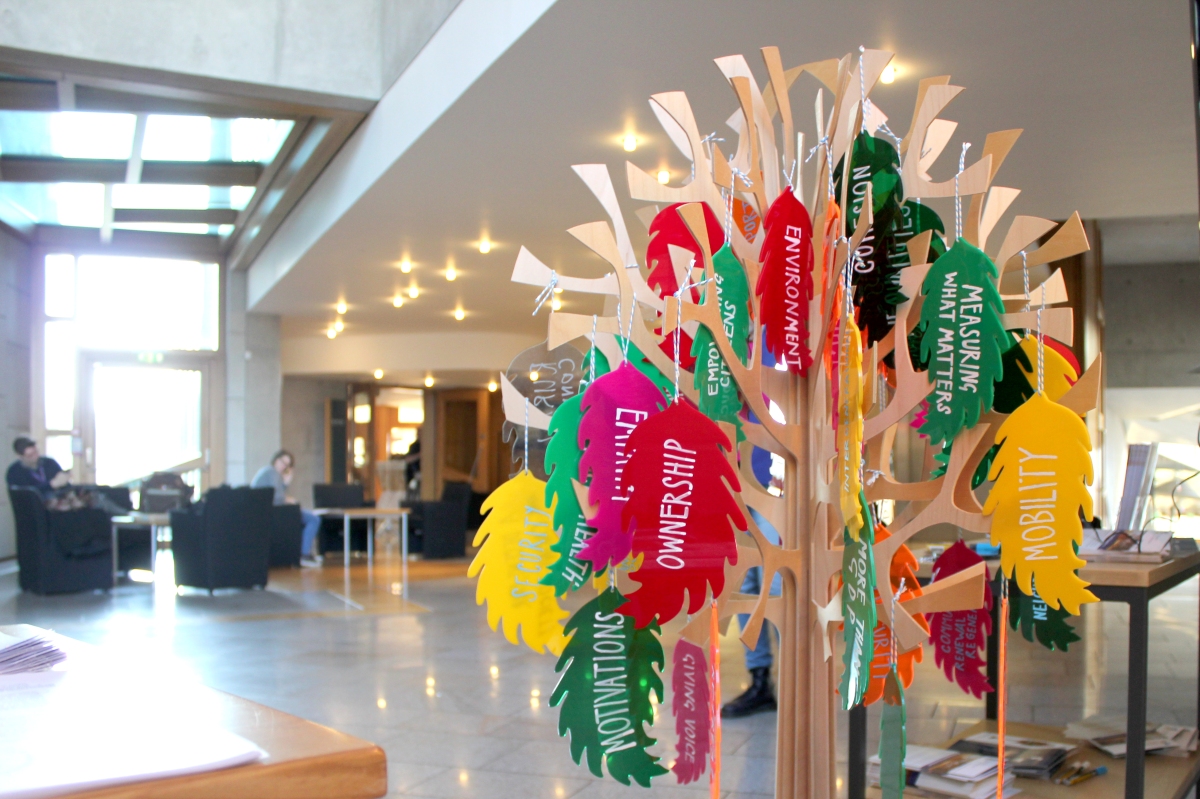We are about to embark on the decision making process for our next themed call around the broad topic of interdependence and cooperation. Applications close on 23rd November and following our Programme Committee meeting in December the projects selected will run for the first nine months or so of 2019. With this in mind, it seems an appropriate time to reflect on the projects that were part of our last themed programme carried out in 2018, which was in support of Scotland’s Futures Forum’s work on Scotland in 2030. Continue reading “Joining the Dots in 2030 – Charlie Woods”
Tag: wellbeing
Promoting Wellbeing: What Works? – Charlie Woods
I recently attended a conference organised by ‘What Works Wellbeing’, which looked at the emerging evidence of what promotes wellbeing and quality of life for individuals and society more generally. The conference was organised around the themes of the What Works programme – work and learning, culture and sport, communities and cross cutting methods.
The idea behind a wellbeing focus is that it goes beyond narrow measures of economic output. Scotland’s National Performance Framework illustrated below is an excellent example of just such an approach.
Continue reading “Promoting Wellbeing: What Works? – Charlie Woods”
Capitalism in the Age of Robots – Charlie Woods
Capitalism in the age of robots
In April this year Adair Turner (Chair of the Institute for New Economic Thinking) gave a speech entitled “Capitalism in the age of robots: work, income and wealth in the 21st century.” In it Turner argued that the rapid and unstoppable development of automation—based on robotics, artificial intelligence and machine learning—will have profound implications for how we live and work over the next fifty to a hundred years.
Continue reading “Capitalism in the Age of Robots – Charlie Woods”
Creative Communities: Making the Invisible Visible through Creative Expression of Mental Wellbeing in Land and Sea Communities
This innovative programme seeks to create new modes of expression to address, communicate, and share the often obscured challenges of people experiencing (or affected by) mental ill-health. Focusing particularly on the rural areas of Scotland, from land-based to maritime communities, it will explore how to develop an increased sense of personhood and collective wellbeing in these frequently invisible communities. It seeks to understand how the resilience of rural communities and the wellbeing of individuals can be enhanced if mental health issues are expressed, shared and addressed more widely. Its overarching aims are to inform the Scottish Government Rural and Mental Health Policy development, and to contribute more generally to the Mental Health agenda in Scotland by reflecting the lived experience expressed by citizens.
Programme Team:
Professor Irene McAra-McWilliam (The Glasgow School of Art), Design Innovation.
Professor Chris Speed (Edinburgh College of Art), Chair of Informatics.
Professor Stewart Mercer (University of Glasgow), Chair in Primary Care Research.
Professor Sarah Skerratt (Scotland’s Rural College), Director of SRUC’s Rural Policy Centre.
Dr Jane Atterton (Scotland’s Rural College) – Rural and regional development issues, rural economies and businesses.
Dr Tara French (The Glasgow School of Art) – Psychology and Design Innovation.
Dr Mafalda Moreira (The Glasgow School of Art) – Amplified Design Mindset, human-centred and strategic design.
Dr Cheryl McGeachan (University of Glasgow) – Human Geographer, historical and cultural geographies of mental ill-health.
Wellbeing: increasingly a crucial public policy goal
SUII Director, Charlie Woods, discusses the continued attention being dedicated to conceptions of wellbeing in research, policy and practice.
SUII Director, Charlie Woods, discusses the continued attention being dedicated to conceptions of wellbeing in research, policy and practice.
It has been four years since our themed programme on wellbeing (summarised here), which looked at the insights from taking a wider wellbeing approach to public policy and practice. Over this period, there has been a steady increase in interest in promoting wellbeing as a policy objective. This note highlights a couple of recent examples.
Continue reading “Wellbeing: increasingly a crucial public policy goal”
Reducing harm and promoting wellbeing amongst people who have housing, health and substance use challenges
The seminar series entitled ‘An international and intersectional dialogue on how to reduce harm and promote wellbeing amongst people who have housing, health and substance use challenges’ started on the 27th of November in the Scottish Universities Insight Institute premises in Glasgow. For any member of an organising committee, there is always a certain degree of nervousness on the first day of an event. However, this was one occasion where the atmosphere was relaxed and conducive to interesting conversations from the very beginning.
New Programme – Reducing harm and promoting wellbeing amongst people who have housing, health and substance use challenges
In the fourth of our introductions to the new programmes, Dr Tessa Parkes, Dr Hannah Carver, and Dr Fiona Cuthill provide a bit more detail on their new programme.
Statistics, wellbeing and policy
In the week that we celebrated World Statistics Day it seems fitting to reflect back on what I learned recently at the OECD World Forum on Statistics, Knowledge and Policy in Mexico. The forum was the fifth of its kind over the last decade that have focussed on the need for better measures and policies for societal progress. This year, the strapline, ‘Transforming Policy, Changing Lives’ signalled a move forward from simply measuring progress, to translating these measures into policy and practice.
The conference highlighted that much work has been done in recent years to develop robust indicators and collect data on wellbeing across different countries, and there was a strong sense that wellbeing is now part of a mainstream agenda, backed by evidence and data. This is coupled with a growing international acceptance of the need to move beyond GDP as the sole measure of progress. Continue reading “Statistics, wellbeing and policy”
Working wellbeing into the heart of Government
Martyn Evans, Co-Chair of the Carnegie Roundtable on Measuring Wellbeing in Northern Ireland
Northern Ireland has topped UK tables for self-reported wellbeing, featuring in four out of the five happiest places in the UK. But behind this headline, challenges remain. Recently released figures show that 12,000 people visited Northern Ireland’s emergency departments last year due to self-harm or suicidal thoughts, and that there were 2,112 water pollution incidents in Northern Ireland in 2013.
The above figures show that in order for the Northern Ireland Executive to assess how Northern Ireland is progressing, it needs to consider not just its economic performance, but also how the lives of its citizens are improving, if, in fact, they are. That is not to say that the economy is not important – participants in the focus groups commissioned by the Carnegie Roundtable on Measuring Wellbeing in Northern Ireland told us that unemployment is a priority for communities in Northern Ireland. But, equally, so are addressing social isolation and mental health issues, according to their feedback.
This is why in its new report the Carnegie Roundtable has called for the Executive to develop a wellbeing framework, Continue reading “Working wellbeing into the heart of Government”
Wellbeing Exhibition: Engaging with Policymakers


From 24-26 February 2015 we took over a small space in the members’ lobby at the Scottish Parliament to showcase the work from our recent Wellbeing Programme. The exhibition brought together the findings from our six funded programmes and provided a way of engaging in discussions with MSPs and Government officials. The programme was seeking to address three broad questions:
- What influences individual and societal wellbeing?
- How best to measure wellbeing and what influences it to help shape and guide policy and practice?
- How best to promote and embed improved wellbeing?
The objective of the initiative was to make a contribution to the development of policy and practice in Scotland and elsewhere, including the development of Scotland’s National Performance Framework, ‘Scotland Performs’.
A wellbeing approach attempts to take a balanced look across social, economic and environmental dimensions at understanding what influences the wellbeing of citizens and society at large, and measuring progress. It’s not about any one factor such as health or income, it’s about a range of influences – Charlie Woods, Director SUII
Continue reading “Wellbeing Exhibition: Engaging with Policymakers”







